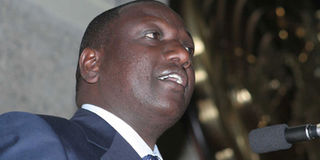Ruto beats a retreat, rejects Hague trials

Agriculture minister William Ruto. FILE/PHOTO
What you need to know:
- Minister who backed ICC route now roots for truth, justice and reconcilliation team
Agriculture minister William Ruto was at it again on Wednesday. Tired of pushing for The Hague, he has now turned full circle and wants post-election violence cases handled by a Truth, Justice and Reconciliation Commission.
In doing this, he seems to be joining the chorus started by his Cabinet colleagues, Mr William ole Ntimama and Mr Najib Balala during Tuesday’s Cabinet meeting.
Mr Ruto was addressing mourners at Kiptere in Kericho District, during the burial of Mr Isaiah Mutai, a businessman.
Tried at the Hague
Mr Ruto has in the past argued strongly for sponsors of the violence that killed 1,133 to be tried by the International Criminal Court at The Hague, instead of having them dealt with locally.
While opposing the local trials, Mr Ruto had said that these would re-ignite ethnic clashes.
He has always added the rider that those who he accuses of rigging the 2007 presidential election should be made to account first before punishing those who were protesting against the outcome.
Though he voted for a local tribunal together with other Cabinet ministers in Parliament, Mr Ruto has publicly opposed setting up such a tribunal.
Yesterday, he led five other MPs from the Rift Valley in demanding that a truth, justice and reconciliation commission be set to address the issue.
His change of mind came barely a week after chief mediator Kofi Annan handed over the envelope with the list of key suspects to the prosecutor of the International Criminal Court, Mr Luis Moreno-Ocampo.
On Tuesday, a Cabinet meeting seeking to establish a local tribunal rejected the draft Independent Tribunal Bill.
The position taken by MPs is also likely to drive a wedge within ODM, whose leader Raila Odinga has been pushing for a local tribunal against the wishes of some of the party MPs.
Mr Ruto on Wednesday claimed that both the International Criminal Court and the local tribunal were not capable of addressing the root cause of the post-election violence which also displaced over 650,000 people.
“Neither Moreno-Ocampo nor Barack Obama will help us. A local tribunal will also not address all the issues,” he said.
Similar sentiments were expressed by Roads minister Franklin Bett, Energy assistant minister Charles Keter, MPs Benjamin Lagat, Zakayo Cheruiyot and Julius Kones.
Mr Cheruiyot said the country was going through a leadership crisis and both President Kibaki and Prime Minister Odinga should show leadership by preaching reconciliation.
And Mr Lagat said: “If the PM says that he was wronged, why didn’t he go to court? And if President Kibaki believed that he won the election and Raila incited his followers to cause chaos, then why didn’t he go to the Hague? They should not subject others to systems they themselves have no faith in.”
Mr Keter said that if the list did not have the names of the two principals then it was “fake” because it was for their sake that people fought.
Outside Constitution
Mr Lagat said that the current government was negotiated outside the Constitution and therefore the two leaders should seek ways outside the local and international laws to solve the country’s problems.
Dr Kones dismissed the Waki report as “an incompetent piece of work” that cannot be relied upon to sustain a prosecution at the Hague.
The local tribunal, on the other hand, he said is subject to manipulation.
In the meantime, political parties yesterday retreated to plot the fate of the draft Bill seeking to set up a local tribunal.
The Cabinet is scheduled to meet on Monday to discuss the Bill which was shelved after Cabinet ministers disagreed on some clauses.
PNU vice-chairman Noah Wekesa On Wednesday said his party wants key suspects to be tried by the Hague.
However, a PNU meeting planned to start on Wednesday in Naivasha to chart the party’s position on the Bill was post-poned.
Another PNU vice-chairman, Mr George Nyamweya, had said the party’s coalition members would possibly go for both local and foreign trials.
Justice minister Mutula Kilonzo, whose draft Bill, which had suggested that the President be stripped of his immunity from prosecution, was rejected by the Cabinet, said Kenya placed itself between a rock and a hard place when, in March 2005, it ratified the Rome agreement establishing the ICC.
“We have to be bold and accept that the moment we signed and ratified the Rome Statute, we rendered our Constitution subservient to the convention,” he said.
In an interview with the Nation, the Justice minister questioned the objections raised over the proposal to strip the President of immunity from prosecution, saying that the Hague does not recognise them. Neither does it recognise the President’s powers to give amnesty.
Other proposals that were also rejected by the Cabinet was one barring the Chief Justice from transferring any judge attached to the special tribunal; blocking courts from issuing injunctions against proceedings before the tribunal; allowing crimes that were committed before the International Crimes Act came into force to be tried and one third of the tribunal judges being foreigners.
The President postponed a decision to Monday to allow ministers time to study the proposals.
Ms Betty Murungi, a human rights law expert, described the indecision of the Cabinet as unfortunate and called on ministers to close ranks and support the clauses.
She argued that Mr Moreno-Ocampo would not accept a tribunal that did not meet international standards.
And speaking to editors, UN Resident and Humanitarian Coordinator Aeneas Chuma warned of the perils of politicising the process of ending impunity.
“Statements, newspaper articles and TV cues suggesting culpability of certain personalities at this stage are not very helpful as they help to widen the political and tribal rivalries, thereby deepening resentment among citizens,” he said.
Reported by Daniel Otieno, Bernard Namunane and Lucas Barasa




